英语新概念2 Lesson 30 Football or Polo 课件(共45张PPT)
文档属性
| 名称 | 英语新概念2 Lesson 30 Football or Polo 课件(共45张PPT) | 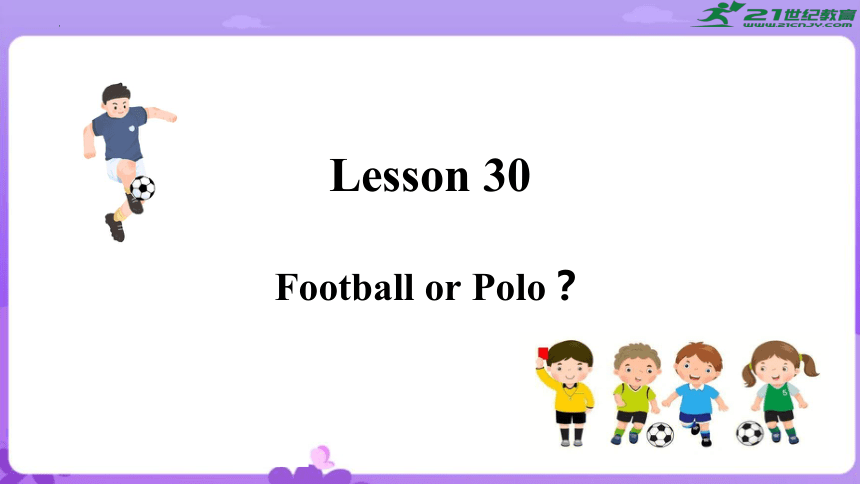 | |
| 格式 | pptx | ||
| 文件大小 | 3.5MB | ||
| 资源类型 | 试卷 | ||
| 版本资源 | 新概念英语 | ||
| 科目 | 英语 | ||
| 更新时间 | 2023-05-17 18:48:51 | ||
图片预览

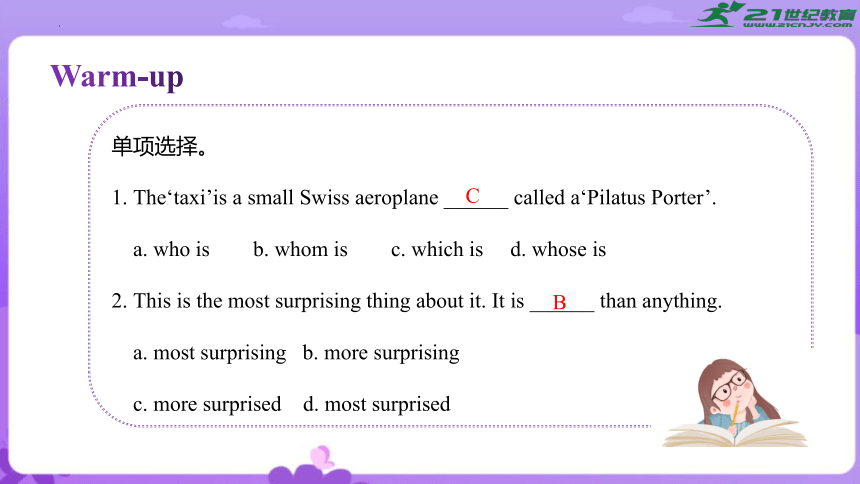
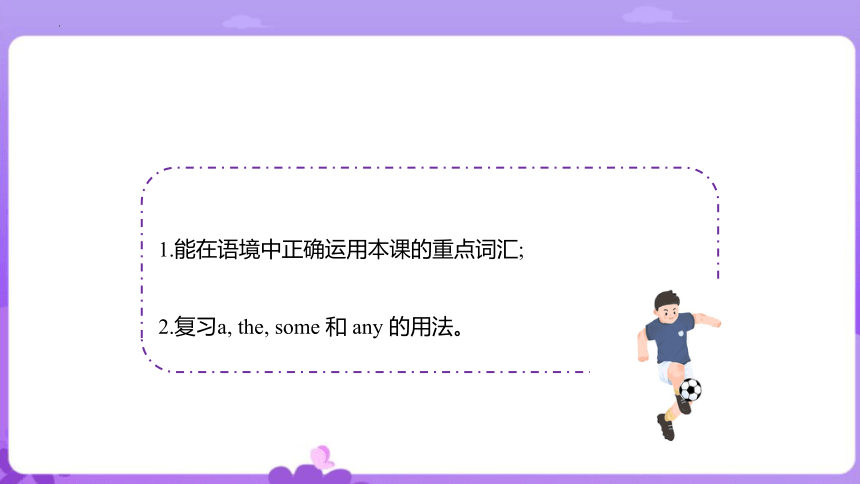
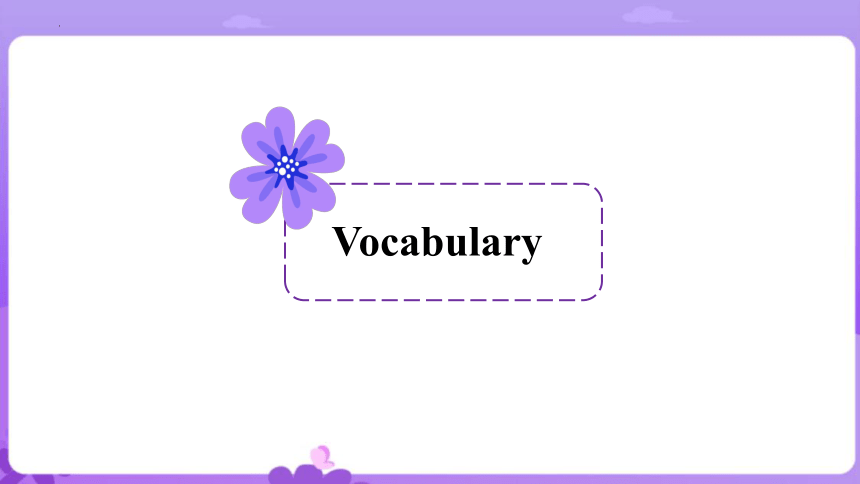
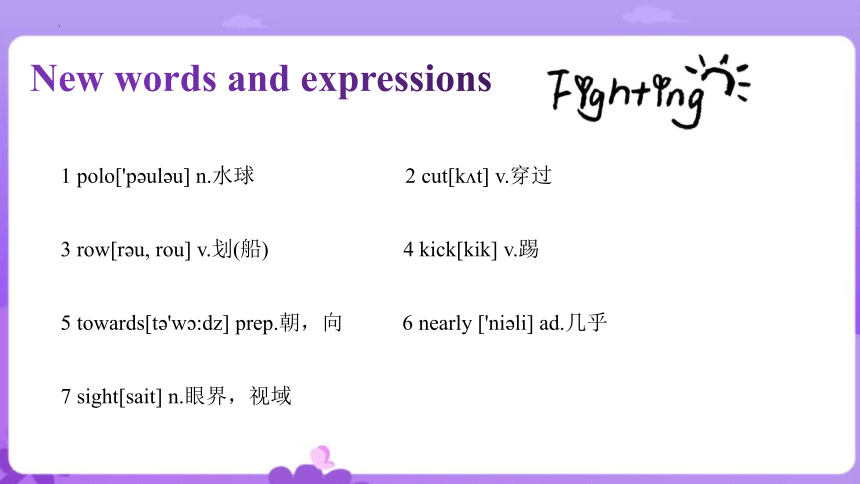
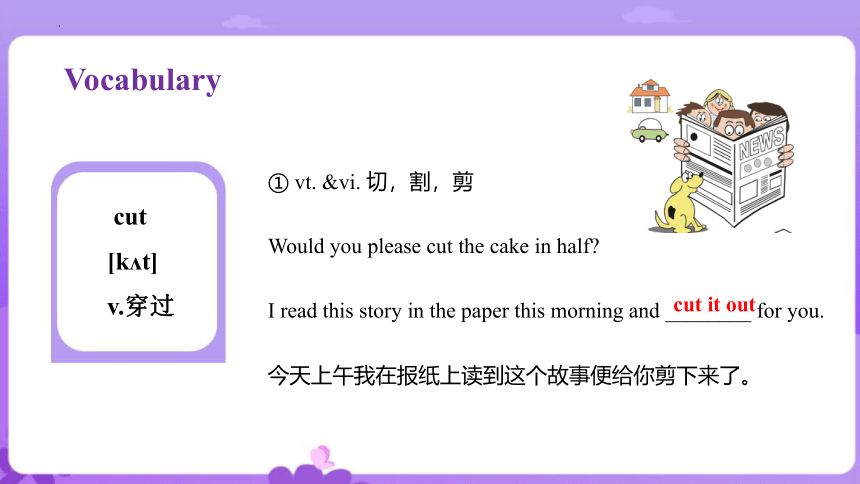

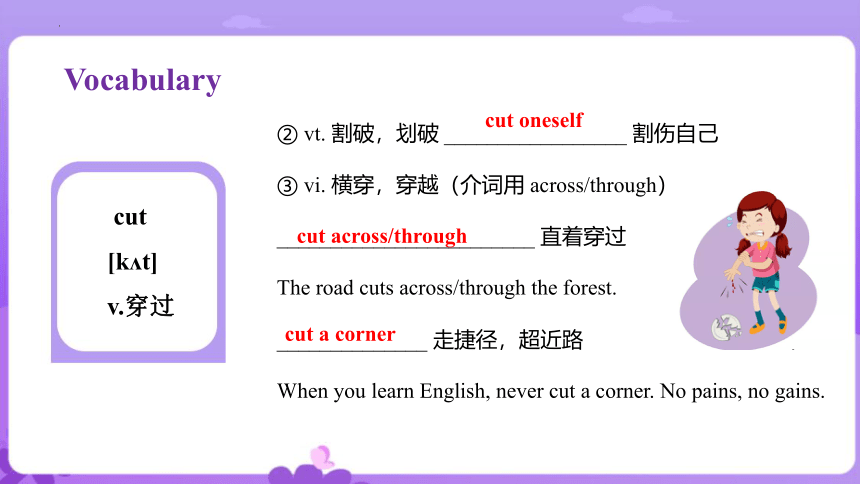
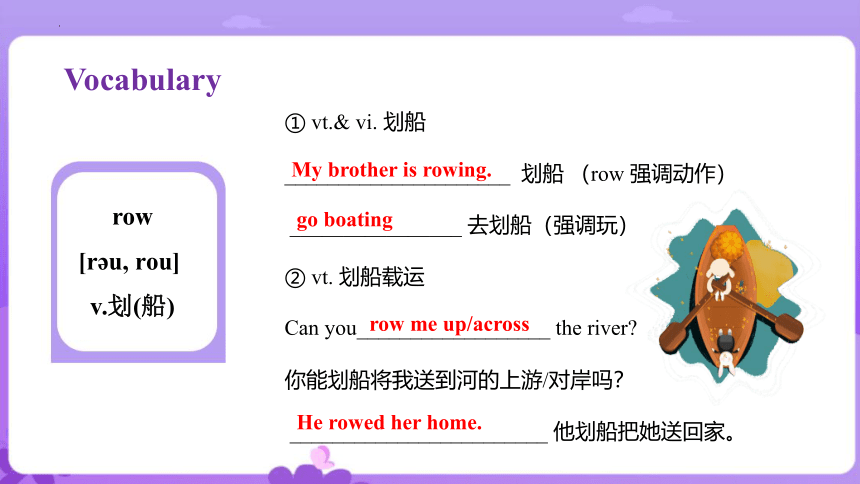
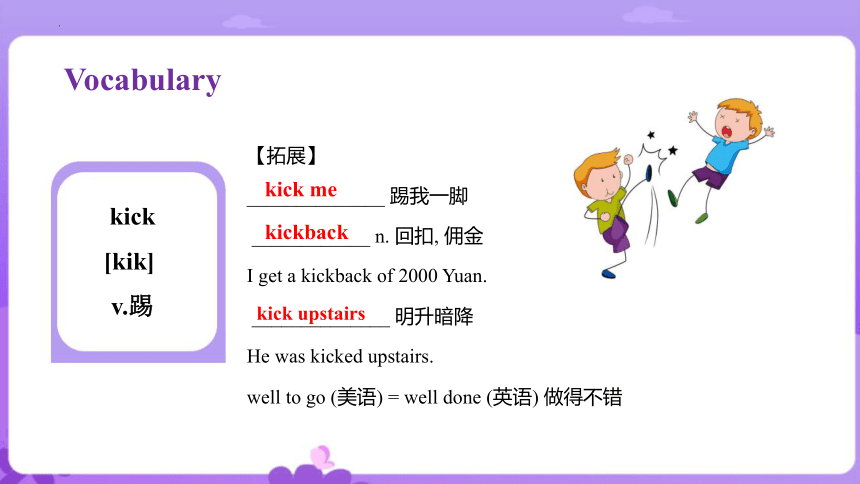
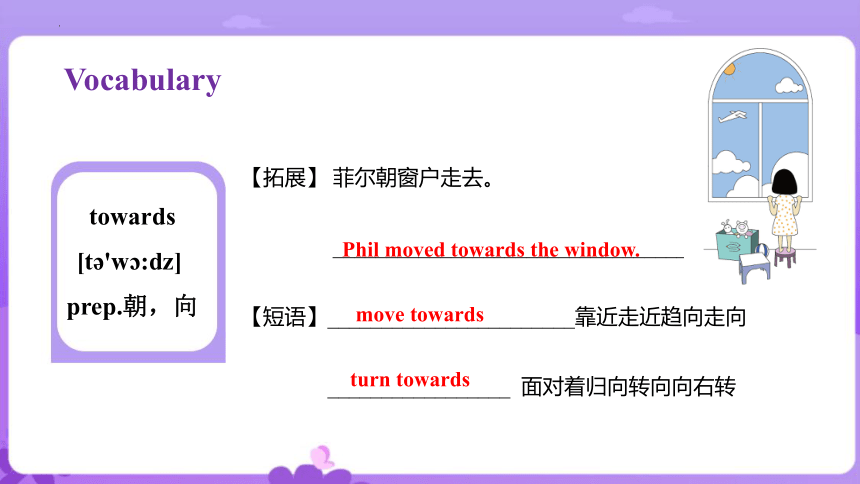
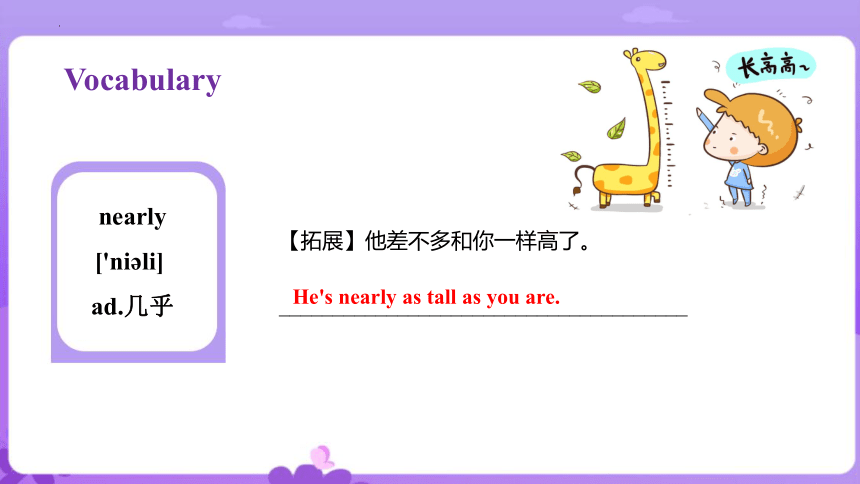
文档简介
(共45张PPT)
Lesson 30
Football or Polo ?
Warm-up
单项选择。
1. The‘taxi’is a small Swiss aeroplane ______ called a‘Pilatus Porter’.
a. who is b. whom is c. which is d. whose is
2. This is the most surprising thing about it. It is ______ than anything.
a. most surprising b. more surprising
c. more surprised d. most surprised
C
B
1.能在语境中正确运用本课的重点词汇;
2.复习a, the, some 和 any 的用法。
Vocabulary
New words and expressions
1 polo['p ul u] n.水球 2 cut[k t] v.穿过
3 row[r u, rou] v.划(船) 4 kick[kik] v.踢
5 towards[t 'w :dz] prep.朝,向 6 nearly ['ni li] ad.几乎
7 sight[sait] n.眼界,视域
① vt. &vi. 切,割,剪
Would you please cut the cake in half
I read this story in the paper this morning and ________ for you.
今天上午我在报纸上读到这个故事便给你剪下来了。
cut
[k t]
v.穿过
Vocabulary
cut it out
cut
[k t]
v.穿过
Vocabulary
【拓展】
___________________________ 理发
______________ 砍树
________________________________ 砍倒树
________________砍脑袋 (off = away from)
_______________ 切断电源
_________________ 把……切成小片(碎)。
cut one's hair = have a hair cut
cut the tree
cut down the tree = cut the tree down
cut the head off
cut off electricity
cut sth. into pieces
② vt. 割破,划破 _________________ 割伤自己
③ vi. 横穿,穿越(介词用 across/through)
________________________ 直着穿过
The road cuts across/through the forest.
______________ 走捷径,超近路
When you learn English, never cut a corner. No pains, no gains.
cut
[k t]
v.穿过
Vocabulary
cut oneself
cut across/through
cut a corner
① vt.& vi. 划船
_____________________ 划船 (row 强调动作)
________________ 去划船(强调玩)
② vt. 划船载运
Can you__________________ the river
你能划船将我送到河的上游/对岸吗?
________________________ 他划船把她送回家。
row
[r u, rou]
v.划(船)
Vocabulary
My brother is rowing.
go boating
row me up/across
He rowed her home.
【拓展】
______________ 踢我一脚
____________ n. 回扣, 佣金
I get a kickback of 2000 Yuan.
______________ 明升暗降
He was kicked upstairs.
well to go (美语) = well done (英语) 做得不错
kick
[kik]
v.踢
Vocabulary
kick me
kickback
kick upstairs
【拓展】 菲尔朝窗户走去。
____________________________________
【短语】_______________________靠近走近趋向走向
_________________ 面对着归向转向向右转
towards
[t 'w :dz]
prep.朝,向
Vocabulary
Phil moved towards the window.
move towards
turn towards
【拓展】他差不多和你一样高了。______________________________________
nearly
['ni li]
ad.几乎
Vocabulary
He's nearly as tall as you are.
【拓展】
____________________ 看见
catch sight of the bird =see the bird 看见那只鸟
___________________ 在视线之外
______________________ 眼不见心不烦
sight
[sait]
n.眼界,视域
Vocabulary
catch sight of…
out of sight
Out of sight, out of mind.
【拓展】
____________________ 在视线之内
The bird is in sight.
__________________ 眼光长远, 远视眼
sb. is long sighted
_________________ 目光短浅, 近视
sight
[sait]
n.眼界,视域
Vocabulary
in sight
long sighted
short sighted
Text
The Wayle is a small river that cuts across the park near my home. I like sitting by the Wayle on fine afternoons. It was warm last Sunday, so I went and sat on the river bank as usual.
Some children were playing games on the bank and there were some people rowing on the river. Suddenly, one of the children kicked a ball very hard and it went towards a passing boat. Some people on the bank called out to the man in the boat, but he did not hear them. The ball struck him so hard that he nearly fell into the water. I turned to look at the children, but there weren't any in sight: they had all run away! The man laughed when he realized what had happened. He called out to the children and threw the ball back to the bank.
The Wayle is a small river that cuts across the park near my home. I like sitting by the Wayle on fine afternoons. It was warm last Sunday, so I went and sat on the river bank as usual.
Some children were playing games on the bank and there were some people rowing on the river. Suddenly, one of the children kicked a ball very hard and it went towards a passing boat. Some people on the bank called out to the man in the boat, but he did not hear them. The ball struck him so hard that he nearly fell into the water. I turned to look at the children, but there weren't any in sight: they had all run away! The man laughed when he realized what had happened. He called out to the children and threw the ball back to the bank.
The Wayle is a small river that cuts across the park near my home.
Wayle是河名,所以前面必须加定冠词the;
river是在文中第一次出现的一个普通名词,所以用不定冠词a,冠词的用法详见第6课中的讲解。
that 引导的是一个定语从句,修饰 a small river
有关cut的短语辨析
短语 意思 例句
cut across sth 取捷径穿过(田地等) If we cut across the field, we can get there before 5 p. m.
cut sth. away 割掉,砍去 We cut away all the dead wood from the tree.
cut sth. down 砍倒,还可以指减少数量或减价等 I will cut down expenses on CDs.
We managed to cut him down by 30.
cut into 插嘴,打断 Don't cut into the story/the conversation.
cut sth. off 切去(尖端部分) He cut the chicken's head off.
I like sitting by the Wayle on fine afternoons.
afternoons 为复数,表示经常、习惯性动作,又由于afternoons 前面有限定词fine,所以介词只能用on .
表示某个具体的日子或者其早、中、晚,需要介词on
like to do sth. 喜欢……(一次性的)
I like to drink tea.
like doing sth. 喜欢……(习惯性的)
I like drinking water.
我喜欢在天气晴朗的下午到河边坐坐。
It was warm last Sunday, so I went and sat on the river bank as usual.
as usual 和往常一样
上星期日天气很暖和,
于是我和往常一样,又去河边坐着。
Some children were playing games on the bank and there were some people rowing on the river.
rowing是现在分词表示补充说明人们在做什么,和people构成主动关系。
"e. g. There are some boys playing football on the ground.
Suddenly, one of the children kicked a ball very hard and it went towards a passing boat.
towards:表示朝向,相当于in the direction of....
e. g. He climbed towards the top of the mountain.
passing 是现在分词作定语,表示动作正在进行。
Some people on the bank called out to the man in the boat, but he did not hear them.
some 和 any 都表示“一些”。其区别如下:
1)some通常用于肯定句,any通常用于否定句和疑问句。
e. g. There is some milk in the fridge.Is there any soap in the bathroom
2)当疑问句表示请求、要求或期待肯定回答时,则用 some。
Some people on the bank called out to the man in the boat, but he did not hear them.
call out 大声呼叫,叫喊
I heard someone calling out for help.
call out to sb. 对……大声喊
Mary called out to her father, but he was too far away and couldn’t hear her.
The ball struck him so hard that he nearly fell into the water.
so…that… 如此……以致于…… (that 引导的结果状语从句)
The teacher speaks so fast that I can't catch the word.
My brother walks so slowly that he can't catch up with me. (赶不上)
The English is so easy that I can learn it well.
so 的后面跟副词或形容词, 如后跟名词时要用 such +n. +that…
I turned to look at the children, but there weren't any in sight: they had all run away!
in sight 看得见,在视野之内(反义词为 out of sight)
与sight有关的重要短语如下:
out of sight: 看不见,在视野之外
catch sight of sb./sth.:看见某人/物。
at (the) sight of sth. / sb.:一看见某人或某物。
Out of sight,out of mind. 眼不见,心不烦。
run away:意为逃跑,消失。
e. g. The boy ran away as soon as possible after he broke the window.
I turned to look at the children, but there weren't any in sight:
they had all run away!
1 The writer_________
(a) likes sitting on the bank of the river when it's fine
(b) rarely goes to the river
(c) likes sitting on the bank of the river all the time
(d) likes sitting on the bank of the river on Sundays
2 One of these statements is true. Which one
(a) Some people tried to warn the man about the ball.
(b) Some people shouted to the writer, but he didn't hear them.
(c) The children laughed when they realized what had happened.
(d) The man was angry with the children and kept their ball.
Questions:
Grammar
some and any
Grammar
some 不用于否定句,any 通常用于否定句和疑问句,
some 在表示邀请的语气中或在疑问句中如果所期
望的回答是肯定的,可以取代 any
Do you want some / Would you want something
Do you want any drink 你想要喝点什么吗 (不愿意给别人喝)
Would you want some to drink
Grammar
在姓名、地名、国名(非复合词)前面通常不加任何冠词。但在特指的海洋、河流、山脉以及部分复合词形式的国名前,一定要用定冠词 the;在表示世界上独一无二的东西时,通常要加定冠词 the.
It can get very rough in the Mediterranean. 地中海中可能会非常不平静.
Many great cities are built on rivers. Paris is on the Seine, London is on the Thames and Rome is on the Tiber.
the 的用法
Grammar
许多大城市都建在河岸上. 巴黎在塞纳河上, 伦敦在泰晤士河上, 罗马在第伯尔河上.
I know a man who has been on climbing expeditions in many parts of the world. He has climbed in the Alps, the Himalayas, and the Rocky Mountains.
我认识一个参加过世界各地登山探险的人. 他曾攀登过阿尔卑斯山、喜马拉雅山和洛矶山.
在 such 后面用 a/an,可以起强调作用
I’ve never seen such a strong wind before.
the 的用法
Grammar
Exercises (在必要的地方填上冠词 a 或 the)
1 ______ refrigerators are necessary in ______ hot countries.
2 Which river is ______ longest, ______ Nile, ______ Amazon, or ______ Mississippi
3 Heyerdahl crossed ______ Pacific on ______ raft.
4 Why is ______ Britain sometimes called ______ United Kingdom
5 We sailed up ______ Red Sea and then went through ______ Suez Canal.
Grammar
答案:
1.不填;解析:in hot countries: 指的是炎热的那类国家, 故不用 the
2. the,the,the,the
3.the,a
4. \,the
5.the,the
解析:横渡海峡用“across”;和运河相连介词用 through,不用 “across”
1. It cuts across the park. It goes ____ it.
a. through b. over c. round d. along
2. There weren't any in sight. They ______ .
a. couldn't see b. hadn't seen c. couldn't be seen d. weren't seen
Grammar
A
C
Practice
用括号内所给单词的适当形式完成句子。
1.—We didn’t find Smith attending the lecture.
—No one _______ (told, had told) him about there being a lecture the following day.
2._______ (A, The, /) Shanghai you see today is quite a different city from what it used to be.
3.The train ran over to a boy and his god _______ (who, that, which) were just crossing the track.
cut across call out throw (…) to
turn to run away
用所给单词或短语的正确形式填空
1.A large number of kinds of light sticks ________________ the ground.
2.We can gain some time if we ________________ this field.
3.________________ the numbers so that we can hear them at the back.
4.Sam’s cell phone is ringing. All the students ________________ look at Sam.
5.The thief ________________ when the policemen came.
单项选择
1. ________ Europe and ________ America are separated by ________ Atlantic Ocean.
[A] /; /; the [B] the; the; the
[C] /; /; / [D] the; the; /
2. We saw several natives advancing towards our party, and one of them came up to us, ________ we gave some bells and glasses.
[A] to which [B] to whom
[C] with whom [D] with which
A
B
3. The place ________ the bridge is supposed to be built should be _____ the cross-river traffic is the heaviest.
[A] which; where [B] at which; which
[C] at which; where [D] which; in which
4. Sarah has read lots of stories by Americana writers. Now she would like to read ________ stories by writers from ________ countries.
[A] some; any [B] other; some
[C] other; other [D] some; other
C
D
根据汉语提示完成下列句子。
1. 作者在天气晴朗的下午通常做什么
What does the writer usually do ________________
2. 一艘过路的船只搭救了遭受船难的水手。
The shipwrecked sailors were picked up by ________________.
根据汉语提示完成下列句子。
3. 生病后她是如此虚弱以至于没有人帮忙她甚至不能走动。
She was ________________ weak after the illness ________________ she couldn’t even walk without help.
4. 我又沿着人行道而行,已经看得见医院了,比一个面包盒稍大一点。
I walk along the sidewalk again; the hospital is ________________ now, slightly larger than a breadbox.
Lesson 30
polo, Wayle,
cut, row,
kick, towards,
nearly, sight
a,the,some,any的用法
Lesson 30
Football or Polo ?
Warm-up
单项选择。
1. The‘taxi’is a small Swiss aeroplane ______ called a‘Pilatus Porter’.
a. who is b. whom is c. which is d. whose is
2. This is the most surprising thing about it. It is ______ than anything.
a. most surprising b. more surprising
c. more surprised d. most surprised
C
B
1.能在语境中正确运用本课的重点词汇;
2.复习a, the, some 和 any 的用法。
Vocabulary
New words and expressions
1 polo['p ul u] n.水球 2 cut[k t] v.穿过
3 row[r u, rou] v.划(船) 4 kick[kik] v.踢
5 towards[t 'w :dz] prep.朝,向 6 nearly ['ni li] ad.几乎
7 sight[sait] n.眼界,视域
① vt. &vi. 切,割,剪
Would you please cut the cake in half
I read this story in the paper this morning and ________ for you.
今天上午我在报纸上读到这个故事便给你剪下来了。
cut
[k t]
v.穿过
Vocabulary
cut it out
cut
[k t]
v.穿过
Vocabulary
【拓展】
___________________________ 理发
______________ 砍树
________________________________ 砍倒树
________________砍脑袋 (off = away from)
_______________ 切断电源
_________________ 把……切成小片(碎)。
cut one's hair = have a hair cut
cut the tree
cut down the tree = cut the tree down
cut the head off
cut off electricity
cut sth. into pieces
② vt. 割破,划破 _________________ 割伤自己
③ vi. 横穿,穿越(介词用 across/through)
________________________ 直着穿过
The road cuts across/through the forest.
______________ 走捷径,超近路
When you learn English, never cut a corner. No pains, no gains.
cut
[k t]
v.穿过
Vocabulary
cut oneself
cut across/through
cut a corner
① vt.& vi. 划船
_____________________ 划船 (row 强调动作)
________________ 去划船(强调玩)
② vt. 划船载运
Can you__________________ the river
你能划船将我送到河的上游/对岸吗?
________________________ 他划船把她送回家。
row
[r u, rou]
v.划(船)
Vocabulary
My brother is rowing.
go boating
row me up/across
He rowed her home.
【拓展】
______________ 踢我一脚
____________ n. 回扣, 佣金
I get a kickback of 2000 Yuan.
______________ 明升暗降
He was kicked upstairs.
well to go (美语) = well done (英语) 做得不错
kick
[kik]
v.踢
Vocabulary
kick me
kickback
kick upstairs
【拓展】 菲尔朝窗户走去。
____________________________________
【短语】_______________________靠近走近趋向走向
_________________ 面对着归向转向向右转
towards
[t 'w :dz]
prep.朝,向
Vocabulary
Phil moved towards the window.
move towards
turn towards
【拓展】他差不多和你一样高了。______________________________________
nearly
['ni li]
ad.几乎
Vocabulary
He's nearly as tall as you are.
【拓展】
____________________ 看见
catch sight of the bird =see the bird 看见那只鸟
___________________ 在视线之外
______________________ 眼不见心不烦
sight
[sait]
n.眼界,视域
Vocabulary
catch sight of…
out of sight
Out of sight, out of mind.
【拓展】
____________________ 在视线之内
The bird is in sight.
__________________ 眼光长远, 远视眼
sb. is long sighted
_________________ 目光短浅, 近视
sight
[sait]
n.眼界,视域
Vocabulary
in sight
long sighted
short sighted
Text
The Wayle is a small river that cuts across the park near my home. I like sitting by the Wayle on fine afternoons. It was warm last Sunday, so I went and sat on the river bank as usual.
Some children were playing games on the bank and there were some people rowing on the river. Suddenly, one of the children kicked a ball very hard and it went towards a passing boat. Some people on the bank called out to the man in the boat, but he did not hear them. The ball struck him so hard that he nearly fell into the water. I turned to look at the children, but there weren't any in sight: they had all run away! The man laughed when he realized what had happened. He called out to the children and threw the ball back to the bank.
The Wayle is a small river that cuts across the park near my home. I like sitting by the Wayle on fine afternoons. It was warm last Sunday, so I went and sat on the river bank as usual.
Some children were playing games on the bank and there were some people rowing on the river. Suddenly, one of the children kicked a ball very hard and it went towards a passing boat. Some people on the bank called out to the man in the boat, but he did not hear them. The ball struck him so hard that he nearly fell into the water. I turned to look at the children, but there weren't any in sight: they had all run away! The man laughed when he realized what had happened. He called out to the children and threw the ball back to the bank.
The Wayle is a small river that cuts across the park near my home.
Wayle是河名,所以前面必须加定冠词the;
river是在文中第一次出现的一个普通名词,所以用不定冠词a,冠词的用法详见第6课中的讲解。
that 引导的是一个定语从句,修饰 a small river
有关cut的短语辨析
短语 意思 例句
cut across sth 取捷径穿过(田地等) If we cut across the field, we can get there before 5 p. m.
cut sth. away 割掉,砍去 We cut away all the dead wood from the tree.
cut sth. down 砍倒,还可以指减少数量或减价等 I will cut down expenses on CDs.
We managed to cut him down by 30.
cut into 插嘴,打断 Don't cut into the story/the conversation.
cut sth. off 切去(尖端部分) He cut the chicken's head off.
I like sitting by the Wayle on fine afternoons.
afternoons 为复数,表示经常、习惯性动作,又由于afternoons 前面有限定词fine,所以介词只能用on .
表示某个具体的日子或者其早、中、晚,需要介词on
like to do sth. 喜欢……(一次性的)
I like to drink tea.
like doing sth. 喜欢……(习惯性的)
I like drinking water.
我喜欢在天气晴朗的下午到河边坐坐。
It was warm last Sunday, so I went and sat on the river bank as usual.
as usual 和往常一样
上星期日天气很暖和,
于是我和往常一样,又去河边坐着。
Some children were playing games on the bank and there were some people rowing on the river.
rowing是现在分词表示补充说明人们在做什么,和people构成主动关系。
"e. g. There are some boys playing football on the ground.
Suddenly, one of the children kicked a ball very hard and it went towards a passing boat.
towards:表示朝向,相当于in the direction of....
e. g. He climbed towards the top of the mountain.
passing 是现在分词作定语,表示动作正在进行。
Some people on the bank called out to the man in the boat, but he did not hear them.
some 和 any 都表示“一些”。其区别如下:
1)some通常用于肯定句,any通常用于否定句和疑问句。
e. g. There is some milk in the fridge.Is there any soap in the bathroom
2)当疑问句表示请求、要求或期待肯定回答时,则用 some。
Some people on the bank called out to the man in the boat, but he did not hear them.
call out 大声呼叫,叫喊
I heard someone calling out for help.
call out to sb. 对……大声喊
Mary called out to her father, but he was too far away and couldn’t hear her.
The ball struck him so hard that he nearly fell into the water.
so…that… 如此……以致于…… (that 引导的结果状语从句)
The teacher speaks so fast that I can't catch the word.
My brother walks so slowly that he can't catch up with me. (赶不上)
The English is so easy that I can learn it well.
so 的后面跟副词或形容词, 如后跟名词时要用 such +n. +that…
I turned to look at the children, but there weren't any in sight: they had all run away!
in sight 看得见,在视野之内(反义词为 out of sight)
与sight有关的重要短语如下:
out of sight: 看不见,在视野之外
catch sight of sb./sth.:看见某人/物。
at (the) sight of sth. / sb.:一看见某人或某物。
Out of sight,out of mind. 眼不见,心不烦。
run away:意为逃跑,消失。
e. g. The boy ran away as soon as possible after he broke the window.
I turned to look at the children, but there weren't any in sight:
they had all run away!
1 The writer_________
(a) likes sitting on the bank of the river when it's fine
(b) rarely goes to the river
(c) likes sitting on the bank of the river all the time
(d) likes sitting on the bank of the river on Sundays
2 One of these statements is true. Which one
(a) Some people tried to warn the man about the ball.
(b) Some people shouted to the writer, but he didn't hear them.
(c) The children laughed when they realized what had happened.
(d) The man was angry with the children and kept their ball.
Questions:
Grammar
some and any
Grammar
some 不用于否定句,any 通常用于否定句和疑问句,
some 在表示邀请的语气中或在疑问句中如果所期
望的回答是肯定的,可以取代 any
Do you want some / Would you want something
Do you want any drink 你想要喝点什么吗 (不愿意给别人喝)
Would you want some to drink
Grammar
在姓名、地名、国名(非复合词)前面通常不加任何冠词。但在特指的海洋、河流、山脉以及部分复合词形式的国名前,一定要用定冠词 the;在表示世界上独一无二的东西时,通常要加定冠词 the.
It can get very rough in the Mediterranean. 地中海中可能会非常不平静.
Many great cities are built on rivers. Paris is on the Seine, London is on the Thames and Rome is on the Tiber.
the 的用法
Grammar
许多大城市都建在河岸上. 巴黎在塞纳河上, 伦敦在泰晤士河上, 罗马在第伯尔河上.
I know a man who has been on climbing expeditions in many parts of the world. He has climbed in the Alps, the Himalayas, and the Rocky Mountains.
我认识一个参加过世界各地登山探险的人. 他曾攀登过阿尔卑斯山、喜马拉雅山和洛矶山.
在 such 后面用 a/an,可以起强调作用
I’ve never seen such a strong wind before.
the 的用法
Grammar
Exercises (在必要的地方填上冠词 a 或 the)
1 ______ refrigerators are necessary in ______ hot countries.
2 Which river is ______ longest, ______ Nile, ______ Amazon, or ______ Mississippi
3 Heyerdahl crossed ______ Pacific on ______ raft.
4 Why is ______ Britain sometimes called ______ United Kingdom
5 We sailed up ______ Red Sea and then went through ______ Suez Canal.
Grammar
答案:
1.不填;解析:in hot countries: 指的是炎热的那类国家, 故不用 the
2. the,the,the,the
3.the,a
4. \,the
5.the,the
解析:横渡海峡用“across”;和运河相连介词用 through,不用 “across”
1. It cuts across the park. It goes ____ it.
a. through b. over c. round d. along
2. There weren't any in sight. They ______ .
a. couldn't see b. hadn't seen c. couldn't be seen d. weren't seen
Grammar
A
C
Practice
用括号内所给单词的适当形式完成句子。
1.—We didn’t find Smith attending the lecture.
—No one _______ (told, had told) him about there being a lecture the following day.
2._______ (A, The, /) Shanghai you see today is quite a different city from what it used to be.
3.The train ran over to a boy and his god _______ (who, that, which) were just crossing the track.
cut across call out throw (…) to
turn to run away
用所给单词或短语的正确形式填空
1.A large number of kinds of light sticks ________________ the ground.
2.We can gain some time if we ________________ this field.
3.________________ the numbers so that we can hear them at the back.
4.Sam’s cell phone is ringing. All the students ________________ look at Sam.
5.The thief ________________ when the policemen came.
单项选择
1. ________ Europe and ________ America are separated by ________ Atlantic Ocean.
[A] /; /; the [B] the; the; the
[C] /; /; / [D] the; the; /
2. We saw several natives advancing towards our party, and one of them came up to us, ________ we gave some bells and glasses.
[A] to which [B] to whom
[C] with whom [D] with which
A
B
3. The place ________ the bridge is supposed to be built should be _____ the cross-river traffic is the heaviest.
[A] which; where [B] at which; which
[C] at which; where [D] which; in which
4. Sarah has read lots of stories by Americana writers. Now she would like to read ________ stories by writers from ________ countries.
[A] some; any [B] other; some
[C] other; other [D] some; other
C
D
根据汉语提示完成下列句子。
1. 作者在天气晴朗的下午通常做什么
What does the writer usually do ________________
2. 一艘过路的船只搭救了遭受船难的水手。
The shipwrecked sailors were picked up by ________________.
根据汉语提示完成下列句子。
3. 生病后她是如此虚弱以至于没有人帮忙她甚至不能走动。
She was ________________ weak after the illness ________________ she couldn’t even walk without help.
4. 我又沿着人行道而行,已经看得见医院了,比一个面包盒稍大一点。
I walk along the sidewalk again; the hospital is ________________ now, slightly larger than a breadbox.
Lesson 30
polo, Wayle,
cut, row,
kick, towards,
nearly, sight
a,the,some,any的用法
同课章节目录
- Unit 1 That's my father!
- Unit 2 This is our house.
- Unit 3 Get off the bed!
- Unit 4 It's time for lunch!
- Unit 5 That's Ted's puppet.
- Unit 6 This is my uncle's farm.
- Unit 7 What super food!
- Unit 8 They're Dad's shoes!
- Unit 9 They're happy dogs.
- Unit 10 What pretty flowers!
- Unit 11 Nineteen bones in the house!
- Unit 12 Hide behind the bush!
- Unit 13 I can dance!
- Unit 14 They're amazing!
- Unit 15 Let's play football!
